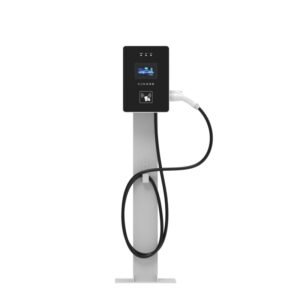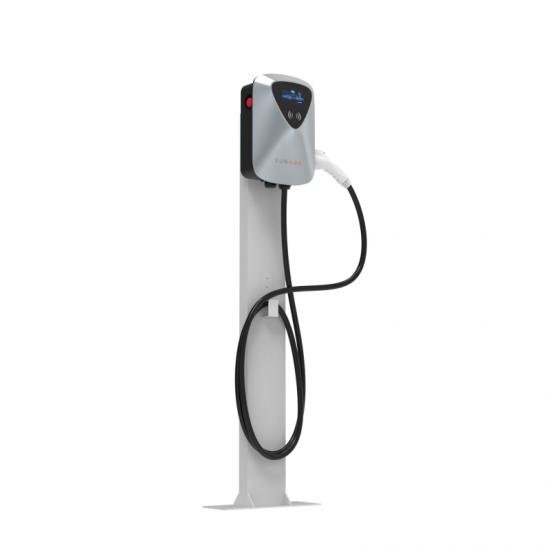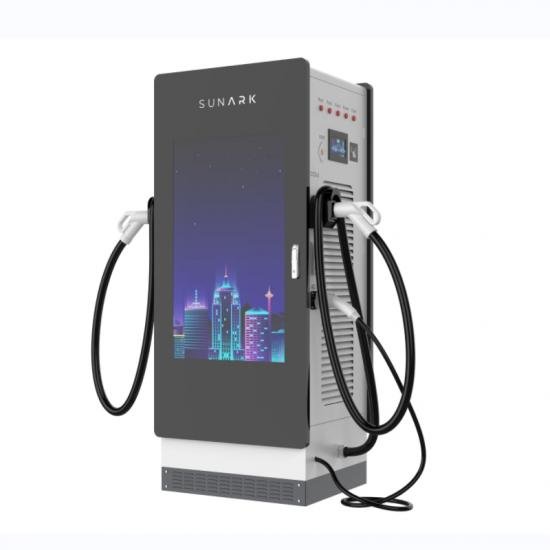
Wholesale AC DC EV Chargers Wallbox 7KW 11KW 22KW
An EV wallbox, also known as an EV charging station or electric vehicle supply equipment (EVSE), is device used to charge electric vehicles (EVs) from an electrical power source. Wallboxes are typically installed in residential homes, commercial buildings, parking garages, or other locations where EV charging is needed.
- Standard:SAE Standard / IEC Standard
- Connector type:Type 1 / Type 2
- Connector Mechanical Operating Life:≥10000 times
- Product categories
how can we help you
Description

The power range of an EV wallbox can vary depending on the specific model and its capabilities. Most wallboxes available on the market support charging levels ranging from 3.6 kilowatts (kW) to 22 kW or higher. These power levels determine the speed at which an EV can be charged.
It’s important to note that the charging power of an EV wallbox should be compatible with the maximum charging capability of your electric vehicle. Different EV models have different maximum charging rates, commonly measured in kilowatts. For example, a particular EV might have a maximum charging rate of 7 kW, so using a wallbox with a power range of 3.6 kW to 22 kW would be suitable for charging that vehicle.
It’s always recommended to consult the specifications of your EV and the EV wallbox to ensure compatibility and optimal charging performance. Additionally, local electrical codes and regulations may have specific requirements for the installation of EV wallboxes, so it’s essential to comply with those guidelines during installation.

Here are some common features of EV wallboxes:
Charging Capacity: EV wallboxes come in various charging capacities, typically ranging from 3.7 kW to 22 kW. Higher-capacity models can charge the vehicle faster, reducing charging time.
Connector Type: Wallboxes support different connector types, such as Type 1 (SAE J1772) or Type 2 (IEC 62196). The connector type varies depending on the region and the EV model.
Charging Modes: Wallboxes usually offer multiple charging modes. The common ones are Mode 2 (using a domestic power outlet with an adapter cable) and Mode 3 (using a dedicated charging cable connected to the wallbox).
Safety Features: EV wallboxes incorporate safety features like overcurrent protection, ground fault detection, and protection against overheating. These features ensure safe and secure charging operations.
Smart Charging: Some advanced wallboxes are equipped with smart charging capabilities. They can communicate with the vehicle, adjust charging rates according to electricity tariffs, and even allow remote monitoring and control through a smartphone application or web portal.

Connectivity: Many EV wallboxes offer connectivity options, such as Wi-Fi or Ethernet, enabling features like software updates, energy consumption tracking, and integration with smart home systems.
Charging Statistics: Wallboxes may provide charging statistics, including energy usage, charging duration, and cost analysis. These features help EV owners monitor their charging patterns and manage electricity consumption.
Design and Compatibility: EV wallboxes come in different designs, including wall-mounted or pedestal models. They should be compatible with EVs from various manufacturers and comply with relevant charging standards.
User Interface: Wallboxes typically have a user-friendly interface, such as an LCD screen or LED indicators, to display charging status, power settings, and error messages.
RFID or Key-based Access Control: Some wallboxes support access control features, requiring an RFID card or a specific key for authorization. This allows controlled usage and prevents unauthorized charging.
Remember that specific features and capabilities may vary depending on the brand, model, and the intended use of the EV wallbox.

How to monitor EV Chargers?
Charger Management Software: Many charging station providers offer software platforms that allow users to monitor and manage their EV chargers remotely. These platforms provide real-time data on charging sessions, energy usage, and payment processing.
Mobile Apps: Some charging station manufacturers provide companion mobile applications that allow users to monitor their charging sessions, check the status of chargers, and receive notifications or alerts.
Networked Charging Stations: Charging stations connected to a network can be monitored centrally by charging station operators or service providers. They can access data on charging status, energy consumption, and any faults or maintenance requirements.
Energy Management Systems: In commercial or public charging installations, energy management systems may be used to monitor and optimize the charging process. These systems can gather data from multiple chargers, manage charging schedules, and balance energy demand.
FAQs:
Q1: Do you support OEM/ODM?
A:Definitely, OEM&ODM service is supported with a certain quantity,including customize logo,package and label;
Q2: What’s the production time?
A: The production time is normally 15 working days. but we will always prepare some stocks for popular models.
Q3: Can you provide DDP service?
A:Yes, if you are a personal customer and don’t want to deal with the customs, we can provide DDP service to your address.
Q4: What about the warranty and how to claim?
A: Warranty period are 5 years since you receive the product, our professional after-sales team will deal with all warranty issues.
Related Tags:
Leave A Message
If you are interested in our products and want to know more details,please leave a message here,we will reply you as soon as we can.
Subject :




